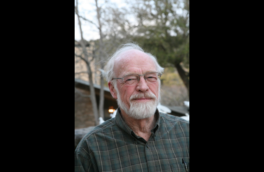 A couple weeks ago Jonathan Merritt (of RNS) interviewed Wendy VanderWal-Gritter about “a third way–for Christians on the ‘gay issue.’” Wendy is the author of the new book Generous Spaciousness: Responding to Gay Christians in the Church. She’s exec director of New Direction Ministries. She has much experience with the peoples of alternative sexual expression in and outside the church. She proposes a middle way for the church called Generous Spaciousness.
A couple weeks ago Jonathan Merritt (of RNS) interviewed Wendy VanderWal-Gritter about “a third way–for Christians on the ‘gay issue.’” Wendy is the author of the new book Generous Spaciousness: Responding to Gay Christians in the Church. She’s exec director of New Direction Ministries. She has much experience with the peoples of alternative sexual expression in and outside the church. She proposes a middle way for the church called Generous Spaciousness.
I think this is a good conversation and very important. People on both sides of this issue have argued there can be no third way, most notably Albert Mohler and Tony Jones. I myself, advocate for a third way in Prodigal Christianity ch. 8. I have detailed it here at the Missio Alliance conference last year. Though I haven’t read Wendy’s book (I hope to review it in the future), I suspect there are some differences between her “middle way” as outlined in the interview, and my “way beyond” proposed in Prodigal Christianity. For the furtherance of the conversation, allow me to test out what I see as two of our differences based off of this interview with Jonathan.
1. “Generous spaciousness” versus “mutual submission.” – In the interview Wendy contrasts generous spaciousness to toleration (after asked a question on that from Jonathan). Versus toleration, she advocates for a practice of mutual respect by listening within a sense of community. There is a “mutual respect” for one for another in the conversation. There is an openness to learning from the other person. Similar way to Wendy, I use the “mutual” word, but I advocate for mutual submission. I admit the word “submission” has baggage. Yet I have not found a word to replace it.(I’ve written on this before here) I believe submission is central to the formation of a space in community where Christ can be present. Through mutually submitting to the Lordship of Christ, clearing any hubris or usurpation, a space is cleared for Him to work. This space does not just leave us “tolerating” or even “mutually appreciating” each other’s views. It pushes us into the Kingdom, what God might be doing in and through us together for the Kingdom. A space is opened up for Christ’s reign to become manifest.
Wendy talks about giving up fear and control, learning to love the other person, and trusting that the Holy Spirit is at work. Here again, we see things similarly. To me this space is opened up when we come together in admission that we all come broken. We come humbled and vulnerable. We are in essence admitting our need of God. Heterosexual, gay, lesbian, bi, trans, etc. we all come broken. In such an admission, we release our hubris and open space for God to work among us. Admittedly, because of the history of the hubris, coercion and abuse of the Christendom church in the way it has treated gay and lesbian persons, few marginalized people can willingly enter such a space like this and trust other Christians. This is why many of us need to go first confessing our past wrongs, our postures of abuse, seek reconciliation, and own our sexual brokenness as we enter into these generous spaces. This must be the first move in opening up these spaces.
2. A Middle Way versus A Way Beyond. Again I haven’t read Wendy’s book, but it appears from the interview that Wendy is advocating a generic space in the local church that allows for differing practices of sexual life to coincide alongside one another indefinitely in the one Kingdom of Christ. This is maybe why the descriptor “middle” is used. It’s a position that stands between the two positions of “Not Affirming” and “Affirming” maintaining each in its own right.
I am proposing something different. I am advocating that in the church God is creating something new. A space that is beyond the current possibilities.
I am influenced by my study of ideology and the way ideology works. Ideology runs on antagonism. It creates identities by posturing one ideological position against another. The negative energy, the “fight,” the anger, and the push to resolve (or win) keeps the two identities going. This, IMO, is the opposite of the space created out of people coming together to submit to one Lord out of the fullness of the work of God in Christ for the new creation. I think, therefore, by definition, the church cannot live in this space.
From my stand point, when I am asked whether I am affirming of LGBTQ relations (like I was on twitter in regards to Missio Alliance last week), if I give an answer either way, by definition, I may be playing into the antagonism already at play. The church needs to discern whether that’s going on. As soon as I take sides within a given ideology, that ideology engulfs me. It defines the answers. And worse, I have now become part of the war. I have lost any wherewithal to be the church in this issue. Ideologies always come with a forced choice. In the world of an ideology, I have to either be for or against something. Third ways (ways beyond) are an anathema to ideology. The Kingdom is contra to ideology (as defined in this way).
The church is called to open space for God to work. In ideological terms, the church is the Aufhebung in the ideological movement. But please don’t understand Aufhebung in the standard shorthand Hegelian – as the synthesis in the thesis-antithesis-synthesis progression. No, the disruption of the thesis (Welcoming but Not Affirming) with the antithesis (Welcoming and Affirming) is not met with a middle synthesis that incorporates both positions. Rather the whole frame of which the questions are asked blows up and falls away (in Zizekian Hegelian terms – it’s a “negation of the negation” ). It is a new space for which God to work the transformation of humanity. What will be kept, what will be gone, cannot be predicted. New creation has begun. In my terms, this is the space of “Welcoming and Mutually Transforming.”
If none of that political theory makes sense to you, let’s not lose the point. The church is called to be the space of peace, where antagonism is extracted, where we come broken, and submit ourselves the cross, the forgiveness and reconciliation of all things, the renewal of the work of the Spirit. There are many who will say no thanks to that. “I’m fine, thank-you.” The church wishes them blessing. But the church is called to be the space of peace, reconciliation, renewal, healing and transformation. It make sense only to the ones seeking such things for their lives.
There are many questions left unanswered here. There are many redflags going off on both sides that are not addressed in this brief blog post. For more of how this works, read more on this blog, or chapter 8 in Prodigal Christianity, or go here to Missio Alliance. And of course, pick up Wendy’s book. Knowing Wendy, I am sure it’s made an important contribution.







Missio Alliance Comment Policy
The Missio Alliance Writing Collectives exist as a ministry of writing to resource theological practitioners for mission. From our Leading Voices to our regular Writing Team and those invited to publish with us as Community Voices, we are creating a space for thoughtful engagement of critical issues and questions facing the North American Church in God’s mission. This sort of thoughtful engagement is something that we seek to engender not only in our publishing, but in conversations that unfold as a result in the comment section of our articles.
Unfortunately, because of the relational distance introduced by online communication, “thoughtful engagement” and “comment sections” seldom go hand in hand. At the same time, censorship of comments by those who disagree with points made by authors, whose anger or limited perspective taints their words, or who simply feel the need to express their own opinion on a topic without any meaningful engagement with the article or comment in question can mask an important window into the true state of Christian discourse. As such, Missio Alliance sets forth the following suggestions for those who wish to engage in conversation around our writing:
1. Seek to understand the author’s intent.
If you disagree with something the an author said, consider framing your response as, “I hear you as saying _________. Am I understanding you correctly? If so, here’s why I disagree. _____________.
2. Seek to make your own voice heard.
We deeply desire and value the voice and perspective of our readers. However you may react to an article we publish or a fellow commenter, we encourage you to set forth that reaction is the most constructive way possible. Use your voice and perspective to move conversation forward rather than shut it down.
3. Share your story.
One of our favorite tenants is that “an enemy is someone whose story we haven’t heard.” Very often disagreements and rants are the result of people talking past rather than to one another. Everyone’s perspective is intimately bound up with their own stories – their contexts and experiences. We encourage you to couch your comments in whatever aspect of your own story might help others understand where you are coming from.
In view of those suggestions for shaping conversation on our site and in an effort to curate a hospitable space of open conversation, Missio Alliance may delete comments and/or ban users who show no regard for constructive engagement, especially those whose comments are easily construed as trolling, threatening, or abusive.